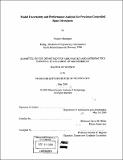Model uncertainty and performance analysis for precision controlled space structures
Author(s)
Bourgault, Frédéric (Frédéric Joseph Normand), 1973-
DownloadFull printable version (12.03Mb)
Other Contributors
Massachusetts Institute of Technology. Dept. of Aeronautics and Astronautics.
Advisor
David W. Miller.
Terms of use
Metadata
Show full item recordAbstract
The purpose of this thesis is to provide confidence for the designer that a concept of a future space-based telescope will meet its very stringent requirements. More specifically, our goal is to predict the amount of uncertainty in the performance prediction made through out the design process. Also, given a statistical database for structural uncertainty, the methodology presented will establish the probability of success of a particular architecture. The traditional design process starts by evaluating and comparing the performance of different concepts by using simplified structural and disturbance models. As the process progresses the different solutions are evaluated and the most promising concept is retained and refined. Eventually, some preliminary structural testing is performed, and the model is updated to reflect the reality more accurately. Eventually, when the production of the system is nearly complete, the model performance predictions should converge to the actual system performance. Large flexible space structures present a problem in using this approach because they are often too flexible to support their own weight and/or too large to fit inside any laboratory facilities to be tested fully assembled. For example, it would be impractical to test the whole assembly of the International Space Station or SIM on the ground. Also, during the preliminary design phase, no test data are available to update the models. Even when the model is very mature and has been updated after experimental testing, a discrepancy remains between the predicted and actual performance of the system. These uncertainties are due to various sources of variability in the system: variable noises (sources and levels), testing conditions and environmental factors, assembly/reassembly, shipset, disturbance levels, and others. How then, can we have confidence that a particular concept will meet the requirements if the only tool we have are finite element models that may not be accurate? The solution is to try to estimate the range of uncertainty around our nominal model performances. Since in the early design phase no test data are available, our best bet will be to use past experience to predict the expected uncertainty range on the performances of our new design. Statistical uncertainty for the modal mass and stiffness parameters, [Hasselman & Chrostowski, 1991], as well as for the modal damping ratios [Simonian, 1987], can be obtained.
Description
Thesis (S.M.)--Massachusetts Institute of Technology, Dept. of Aeronautics and Astronautics, 2000. Also available online at the MIT Theses Online homepage <http://thesis.mit.edu>. Includes bibliographical references (p. 185-191).
Date issued
2000URI
http://theses.mit.edu/Dienst/UI/2.0/Describe/0018.mit.theses%2f2000-19http://hdl.handle.net/1721.1/9240
Department
Massachusetts Institute of Technology. Department of Aeronautics and AstronauticsPublisher
Massachusetts Institute of Technology
Keywords
Aeronautics and Astronautics.